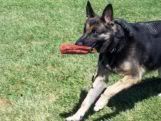Great article posted today in the Sacramento Bee - Thought some of you would be interested in reading it.
Peggy
Animal therapy: Fur better, not worse
Injured police dog, other creatures rehab with expert help
By Carrie Peyton Dahlberg - Bee Staff Writer
With water lapping at his chest, a German shepherd with a big heart and bad legs took step after careful step on an underwater treadmill, guided by a physical therapist who once worked with human patients.
At times, therapist Jackie Woelz would nudge the former police dog slightly to one side, forcing him to steady himself. She'd offer a dog treat at an angle to make him stretch and strengthen muscles.
"This is landmark," Woelz said with satisfaction Tuesday as Taz, once unable to stand, trod underwater with an almost normal gait, supported in part by the water around him.
It was only six months ago, after a full day's work with Sacramento police canine handler Hanspeter Merten, that Taz's normal happy jump from the car turned miserable. He collapsed on the driveway, hind legs useless.
Merten thinks the trouble started the day before, on an April Sunday when Taz fell badly after scrambling over a fence in pursuit of an armed man seen trying to break into a car.
Within days, Taz underwent surgery at the UC Davis Veterinary Medical Teaching Hospital for a bulging disc pressing against his spine and damaging the neural pathway to his back legs.
Then he joined the ranks of dogs, cats, ferrets, llamas and even birds who have undergone therapy at the veterinary hospital's two-year-old physical rehabilitation clinic.
All have at least one thing in common, Woelz said: "a dedicated owner."
At a time when millions of humans are uninsured and others face strict insurance limits of as few as six sessions for physical therapy, Woelz sees demand "exploding" for veterinary rehab.
"There are a lot of pet owners that are looking for this," she said. "Owners are very interested in doing all they can to keep their companions mobile and fit."
For about $75 a session, the furred and sometimes feathered creatures treated by Woelz have access to equipment that some human clinics would envy.
There's a mechanical lift to support an animal's weight just above a treadmill, as Woelz and a technician, kneeling on each side, move their patient's legs to refamiliarize a damaged nervous system with walking.
There are two tanks where animals are surrounded by water that will bear up to 60 percent of their weight, allowing them to build strength while protecting their joints.
Plenty of low-tech gear is on hand, too. Tuesday morning, as Taz rested from his treadmill work, Woelz hauled out a big inflatable yellow ball, a little flattened in the middle, for another patient.
Sarah, a black Lab mix partly paralyzed by a rare allergy to raccoon saliva, was propped over the ball to help her regain her sense of standing and balancing.
Taz's routine can include stepping over cones and poles to improve coordination. Even just tracking a tennis ball dangled from side to side above his nose is therapy, forcing Taz to balance better on his hind legs.
"It's almost a miracle that he's able to walk on his own now," said Merten, who became a homicide detective not long after Taz's injury forced the dog's retirement.
They'd been partners for six years, but now Taz is strictly a pet, clambered over by Merten's three kids, soaking up the attention even when the 1-year-old tugs his ears. The dog's hips still wobble a little, and his right leg can give way, but Merten and Woelz are aiming high -- an easier walk, stronger leg muscles, and maybe even a trot.
The dog's medical bills, already more than $5,000, are being picked up by the nonprofit Sacramento Police Canine Association, which sells T-shirts and stages fundraisers to pay for the care of retired police dogs.
Taz's sessions, once three times a week, are now down to about twice a month, with lots of home therapy in between using exercises devised by Woelz.
"Some patients paralyzed in the rear end have made amazing strides under Jackie's care," said Bradford Smith, director of the Veterinary Medical Teaching Hospital.
The hospital created the rehabilitation clinic, with Woelz as its founding physical therapist, after watching private clinics successfully start offering human-style physical therapy to dogs.
While some physical therapists branched out to animals years ago, extrapolating from what they knew about human physiology, there is little in veterinary literature about which treatments are most effective, Smith said.
The UC Davis clinic aims to help fill that void, documenting outcomes as well as providing better care for animals struggling with illness or injury, he said.
Taz, a German shepherd, participates in a therapy exercise with his former K-9 trainer, Hanspeter Merten. Sacramento Bee/Hector Amezcua



 Top
Top
 Top
Top
 Previous Topic
Previous Topic Index
Index Next Topic
Next Topic
















.jpg)